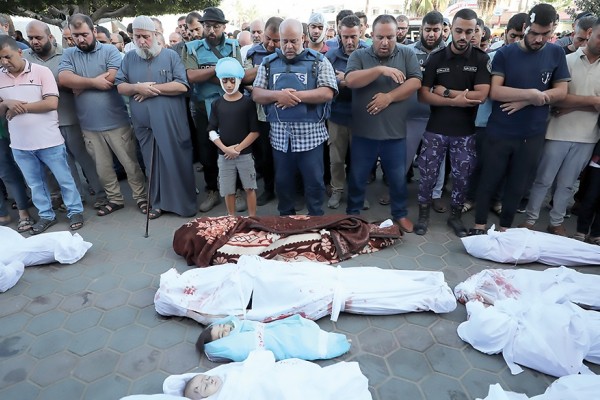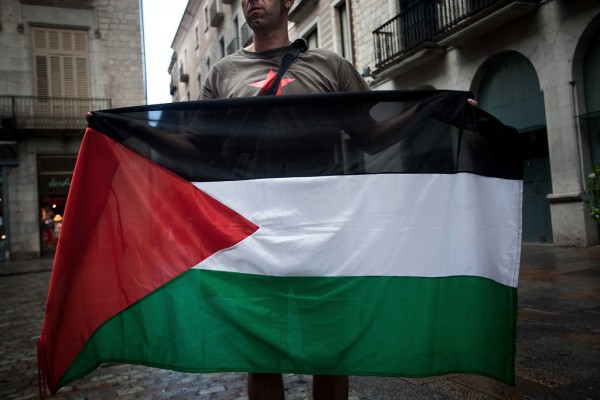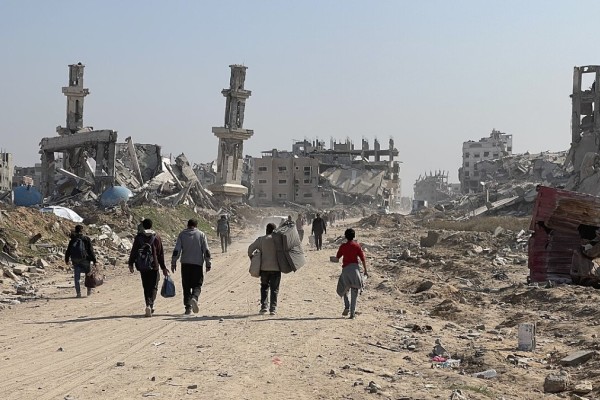Ta-Nehisi Coates, Palestine, and a message of resistance
In The Message, Coates writes of a constellation of shared experiences and renews a call for global solidarity

Israeli checkpoint at the entrance of Shuhada Street in Hebron, Palestine. Photo by Mehdi Chebil.
In East Jerusalem, roughly a dozen participants in the Palestine Festival of Literature, including American author Ta-Nehisi Coates, are met by Israeli soldiers outside the Al-Aqsa complex and are made to wait. “No justifications were given, no questions asked, no instructions offered,” Coates writes. The following day, in the West Bank, as the group of authors are navigating the many checkpoint of Hebron, a soldier asks Coates his religion. When Coates replies that he has none, the soldier inquires about the religion of his parents. “When I told him they were Christian, he allowed me to pass.” On his visit to the West Bank, Coates sees the cisterns, or water reservoirs, that collect rainwater atop the homes of Palestinians—a survival strategy in the face of unequal access to water. He also sees the metal fences ahead of revolving gates and autonomous turrets that fire “non-lethal” rounds via remote control.
Coates’ trip lasted only 10 days, but what he took away from his brief stay and relates in his new book The Message is varied and deep. Coates, a Black man from the United States, found what he witnessed in Palestine reminiscent of Jim Crow in the American South, and of South African apartheid. He sees Israel as being, “like its American patron, an expansionist power” that wants “the land without the Palestinians on it.”
Some would say it is that expansionist drive that connects the everyday indignities, inconveniences, humiliations, and brutalities Palestinians have faced since Israel’s formation with the current moment of live-streamed genocide in Gaza.
Jason Hickel, a professor at the Institute of Environmental Science and Technology at the University of Barcelona, also attributes US support for Israel to expansionism and, more precisely, its determination to “maintain the conditions for capital accumulation and geopolitical hegemony.” In a post on X last August, he wrote that the United States began investing heavily in the Israeli arms industry in the 1960s “with the explicit intention of using Israel as a staging ground—a massive military base—for counter-revolutionary interventions against rising Arab socialist and national liberation struggles in North Africa and the Middle East.” The US would not tolerate Palestinian liberation, he argues, because it “would constrain Israeli power and open the way to regional liberation movements, and this is strongly antithetical to the interests of Western capital.”
With the same capitalist and colonialist motivation guiding them, the core states would neither tolerate liberatory movements elsewhere, having used, for example, apartheid South Africa to suppress large swathes of the continent, writes Hickel. But just as this destructive motivation ties together the repression and the daily humiliations of Palestinians and so many in the Global South, not to mention racialized people in parts of the Global North, the victims of this capitalist and colonialist project can organize a common struggle in response.
In The Message, Coates writes of a constellation of shared experiences—between Black Americans, Africans, Palestinians, and others—which led him to feel “the warmth of solidarity, of conquered peoples… finding each other across the chasm of oceans and experience.” It is the recognition that if these expansionist powers operate conjointly to oppress us, we ought to join in solidarity ourselves.
Though not explicitly connected, the two preceding chapters in The Message, where Coates writes of his travels to Dakar in Senegal and to Columbia in South Carolina, strongly suggest the need to connect seemingly disparate struggles.
Preparing for his first trip to Senegal, where countless Africans were taken from its shores to lose their lives to the transatlantic slave trade voyages or to be enslaved and die in the Americas, Coates reflects on the justifications employed to sustain and expand this project. “For such a grand system, a grand theory had to be crafted and an array of warrants produced, all of them rooted in a simple assertion of fact,” he writes. “The African was barely human at all.”
Later in the book, he quotes Palestinian legal scholar Noura Erakat: “We have all been lied to about too much.”
Although Coates acknowledges that his visit to Dakar was short, his reflections on his experience there inform the rest of the book. He writes that Black people are “victims of the West” whose “own lives and culture… were all crafted in this absurd space beyond the walls of “civilization,” a powerful response greater in every possible way to the conditions which compelled it.
In South Carolina, Coates encounters a school board seeking to ban his 2015 book, Between the World and Me, because it makes white people “uncomfortable” and “ashamed to be Caucasian.” Coates attends a board meeting and, to his surprise, there is an overwhelming level of support from the largely white residents of Columbia for the teacher who assigned his book. This is a testament, Coates believes, to the power of language, of stories, and of clarifying through words.
But the power that forms the thread tying these three trips together is that of solidarity and of resistance to racism, with many faces and from many places. Since publishing the book, Coates has embodied the call for both in his role as a public figure. This prominent intellectual, best-selling author, 2015 MacArthur Fellow and former national correspondent for The Atlantic has repeatedly stated on the public airwaves the very observations and analyses that have gotten lesser-known people disciplined, fired, and doxxed.
In The Message, Coates shows that change can happen when bravery becomes so commonplace that it becomes too costly for the powerful to continue with business as usual. That is a message worth heeding.
Daniel Tseghay is a writer and a communications representative at a private sector union.










